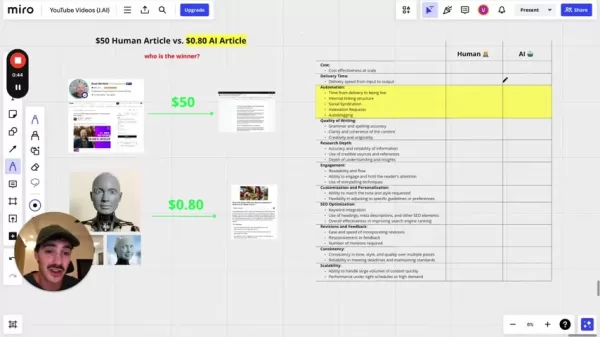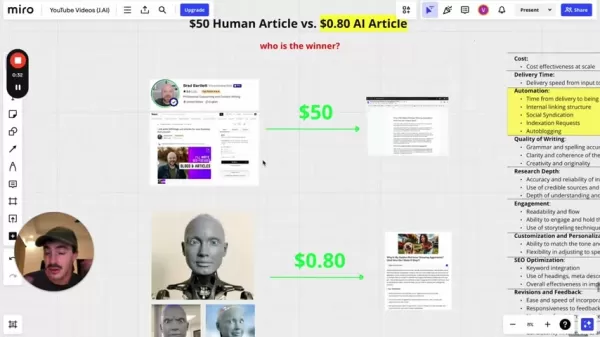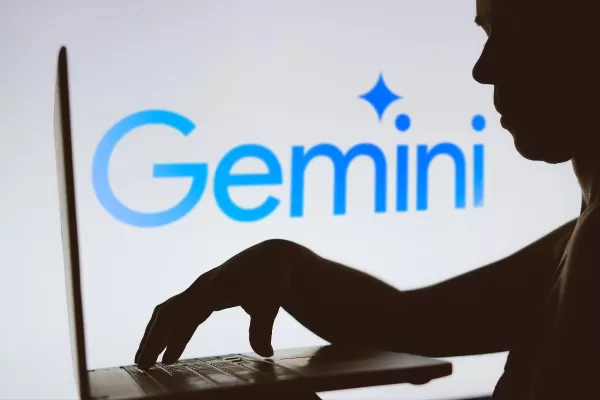AI vs. Human Writers: Can Machines Outshine Creativity?
In a content-driven era, the debate over whether artificial intelligence (AI) can surpass human writers grows louder. AI delivers speed and cost savings, but humans offer unmatched creativity, empathy, and insight. This article explores the showdown between human and AI content creation to uncover the true victor.
Human vs. AI Writing: Key Insights
AI produces content swiftly and affordably compared to human writers.
Humans craft original, empathetic, and nuanced content.
AI content quality hinges on precise prompts and settings.
Both human and AI writing can optimize SEO with proper techniques.
AI excels in scalability, generating large content volumes rapidly.
Cost and Speed: Human vs. AI Content
Cost Efficiency Breakdown
Human writers command $50 to hundreds per article, based on expertise, length, and research. For example, professionals like Brad Bartlett (@bradleebartlett on Fiverr) charge $50 upward per piece.
AI-generated articles cost mere cents to a dollar, depending on the tool and article length. Platforms like Journalist AI create SEO-optimized content quickly and cheaply, appealing to budget-conscious businesses. Yet, quality and impact outweigh cost alone.
SEO Tip: Integrate relevant keywords naturally to boost content visibility. Keyword density varies by human skill or AI tool quality.
Turnaround Time Comparison
AI’s standout strength is speed, producing full articles in minutes.

Human writers may take days or weeks, depending on workload and topic complexity.
Fast delivery suits businesses chasing trends or scaling content, but AI may trade depth and originality for efficiency.
Effective SEO keyword delivery speed matters, alongside overall content creation pace.
Human vs. AI: In-Depth Analysis
Key Factor Breakdown
A thorough comparison reveals strengths and weaknesses of human and AI writing:
Automation: AI streamlines tasks like internal linking and social sharing, saving time but lacking human judgment. Humans must choose topics carefully before publishing.

Writing Quality: AI improves in grammar and accuracy, but humans excel in clarity, coherence, and creative originality.
Research Depth: Both can deliver accurate content, but depth depends on source quality and writer expertise.
Engagement: Humans captivate readers with unique storytelling.
Customization: Humans adapt tone and style more flexibly than AI.
SEO Optimization: AI integrates keywords and headings well, but human insight enhances deeper SEO.
Revisions: AI handles feedback faster; humans need more time.
Consistency: Both maintain style consistency, with AI scaling it across multiple pieces.
Scalability: AI’s strength lies in producing high volumes quickly, ideal for tight schedules.
SEO Note: Choose your writing strategy based on these strengths, ensuring keyword optimization aligns with goals.
Streamlining Content with AI
Journalist AI’s Optimization Tools
Journalist AI offers features to create engaging, high-ranking content:
- SEO Keyword Integration: Seamlessly embeds relevant keywords.
- Web Connectivity: Ensures up-to-date content and accurate links.
- Adaptable AI: Learns and adjusts to user inputs.
- Social Media Automation: Simplifies content sharing.
- Plagiarism Checks: Ensures originality.
Pros and Cons: Human vs. AI Content
Pros
High creativity and originality
Deep understanding of complex topics
Emotional resonance and empathy
Strong reader connection
Compelling storytelling
Cons
Higher costs
Slower delivery
Potential tone inconsistency
Limited scalability
FAQ: Common Questions Answered
Can AI replace human writers?
AI’s speed and affordability shine, but it lacks human creativity and emotional depth. It’s a tool to enhance, not replace, writers.
Is AI content SEO-friendly?
Yes, AI can optimize content with keywords and headings, but human oversight ensures resonance and value.
How to ensure AI content accuracy?
Verify AI content with trusted sources and human review to maintain reliability.
Exploring Further: Related Questions
What’s the future of AI in content creation?
A hybrid model, with AI aiding research and drafting, lets humans focus on creativity and strategy for efficient, impactful content.
What writing suits AI best?
AI excels in informational content like news, product descriptions, and guides, with human input adding depth to creative works.
What are AI writing challenges?
AI risks generic content, plagiarism, or inaccuracies, requiring human oversight for quality and authenticity.
Related article
 Casio Classic Watches Get Modern Upgrades: Bluetooth, Step Tracking & Games
The legendary Casio F-91W digital watch, unchanged since its 1989 debut, is finally receiving modern smart features - though surprisingly not from Casio itself. Enter the Ollee Watch One: an innovative replacement motherboard compatible with Casio's
Casio Classic Watches Get Modern Upgrades: Bluetooth, Step Tracking & Games
The legendary Casio F-91W digital watch, unchanged since its 1989 debut, is finally receiving modern smart features - though surprisingly not from Casio itself. Enter the Ollee Watch One: an innovative replacement motherboard compatible with Casio's
 Google Gemini Chatbot Gains Enhanced GitHub Project Analysis Capabilities
Gemini Advanced Integrates GitHub ConnectivityGoogle's premium Gemini Advanced subscribers ($20/month) can now directly link GitHub repositories to the AI assistant as of Wednesday. This integration enables users to leverage Gemini's capabilities acr
Google Gemini Chatbot Gains Enhanced GitHub Project Analysis Capabilities
Gemini Advanced Integrates GitHub ConnectivityGoogle's premium Gemini Advanced subscribers ($20/month) can now directly link GitHub repositories to the AI assistant as of Wednesday. This integration enables users to leverage Gemini's capabilities acr
 AI Transforms Gaming with Diplomacy, Meta AI, and Reinforcement Learning Advances
The gaming landscape is undergoing profound transformation through artificial intelligence, revolutionizing everything from strategic gameplay to immersive digital experiences. Rather than just competing against human players, AI is reshaping how we
Comments (3)
0/200
AI Transforms Gaming with Diplomacy, Meta AI, and Reinforcement Learning Advances
The gaming landscape is undergoing profound transformation through artificial intelligence, revolutionizing everything from strategic gameplay to immersive digital experiences. Rather than just competing against human players, AI is reshaping how we
Comments (3)
0/200
![DavidGonzález]() DavidGonzález
DavidGonzález
 August 15, 2025 at 7:00:59 AM EDT
August 15, 2025 at 7:00:59 AM EDT
AI writing faster than humans is cool, but can it ever capture the soul of a story like a person does? 🤔 I doubt it!


 0
0
![FrankLewis]() FrankLewis
FrankLewis
 August 5, 2025 at 9:01:00 AM EDT
August 5, 2025 at 9:01:00 AM EDT
AI writing faster than humans is cool, but can it ever nail that gut-punch feeling of a great story? I doubt it—human vibes are just too raw! 😎


 0
0
![ThomasScott]() ThomasScott
ThomasScott
 July 31, 2025 at 7:35:39 AM EDT
July 31, 2025 at 7:35:39 AM EDT
AI writing faster than humans is cool, but can it ever nail that gut-punch feeling of a great story? Doubt it! 😕


 0
0
In a content-driven era, the debate over whether artificial intelligence (AI) can surpass human writers grows louder. AI delivers speed and cost savings, but humans offer unmatched creativity, empathy, and insight. This article explores the showdown between human and AI content creation to uncover the true victor.
Human vs. AI Writing: Key Insights
AI produces content swiftly and affordably compared to human writers.
Humans craft original, empathetic, and nuanced content.
AI content quality hinges on precise prompts and settings.
Both human and AI writing can optimize SEO with proper techniques.
AI excels in scalability, generating large content volumes rapidly.
Cost and Speed: Human vs. AI Content
Cost Efficiency Breakdown
Human writers command $50 to hundreds per article, based on expertise, length, and research. For example, professionals like Brad Bartlett (@bradleebartlett on Fiverr) charge $50 upward per piece.
AI-generated articles cost mere cents to a dollar, depending on the tool and article length. Platforms like Journalist AI create SEO-optimized content quickly and cheaply, appealing to budget-conscious businesses. Yet, quality and impact outweigh cost alone.
SEO Tip: Integrate relevant keywords naturally to boost content visibility. Keyword density varies by human skill or AI tool quality.
Turnaround Time Comparison
AI’s standout strength is speed, producing full articles in minutes.

Human writers may take days or weeks, depending on workload and topic complexity.
Fast delivery suits businesses chasing trends or scaling content, but AI may trade depth and originality for efficiency.
Effective SEO keyword delivery speed matters, alongside overall content creation pace.
Human vs. AI: In-Depth Analysis
Key Factor Breakdown
A thorough comparison reveals strengths and weaknesses of human and AI writing:
Automation: AI streamlines tasks like internal linking and social sharing, saving time but lacking human judgment. Humans must choose topics carefully before publishing.

Writing Quality: AI improves in grammar and accuracy, but humans excel in clarity, coherence, and creative originality.
Research Depth: Both can deliver accurate content, but depth depends on source quality and writer expertise.
Engagement: Humans captivate readers with unique storytelling.
Customization: Humans adapt tone and style more flexibly than AI.
SEO Optimization: AI integrates keywords and headings well, but human insight enhances deeper SEO.
Revisions: AI handles feedback faster; humans need more time.
Consistency: Both maintain style consistency, with AI scaling it across multiple pieces.
Scalability: AI’s strength lies in producing high volumes quickly, ideal for tight schedules.
SEO Note: Choose your writing strategy based on these strengths, ensuring keyword optimization aligns with goals.
Streamlining Content with AI
Journalist AI’s Optimization Tools
Journalist AI offers features to create engaging, high-ranking content:
- SEO Keyword Integration: Seamlessly embeds relevant keywords.
- Web Connectivity: Ensures up-to-date content and accurate links.
- Adaptable AI: Learns and adjusts to user inputs.
- Social Media Automation: Simplifies content sharing.
- Plagiarism Checks: Ensures originality.
Pros and Cons: Human vs. AI Content
Pros
High creativity and originality
Deep understanding of complex topics
Emotional resonance and empathy
Strong reader connection
Compelling storytelling
Cons
Higher costs
Slower delivery
Potential tone inconsistency
Limited scalability
FAQ: Common Questions Answered
Can AI replace human writers?
AI’s speed and affordability shine, but it lacks human creativity and emotional depth. It’s a tool to enhance, not replace, writers.
Is AI content SEO-friendly?
Yes, AI can optimize content with keywords and headings, but human oversight ensures resonance and value.
How to ensure AI content accuracy?
Verify AI content with trusted sources and human review to maintain reliability.
Exploring Further: Related Questions
What’s the future of AI in content creation?
A hybrid model, with AI aiding research and drafting, lets humans focus on creativity and strategy for efficient, impactful content.
What writing suits AI best?
AI excels in informational content like news, product descriptions, and guides, with human input adding depth to creative works.
What are AI writing challenges?
AI risks generic content, plagiarism, or inaccuracies, requiring human oversight for quality and authenticity.
 Casio Classic Watches Get Modern Upgrades: Bluetooth, Step Tracking & Games
The legendary Casio F-91W digital watch, unchanged since its 1989 debut, is finally receiving modern smart features - though surprisingly not from Casio itself. Enter the Ollee Watch One: an innovative replacement motherboard compatible with Casio's
Casio Classic Watches Get Modern Upgrades: Bluetooth, Step Tracking & Games
The legendary Casio F-91W digital watch, unchanged since its 1989 debut, is finally receiving modern smart features - though surprisingly not from Casio itself. Enter the Ollee Watch One: an innovative replacement motherboard compatible with Casio's
 Google Gemini Chatbot Gains Enhanced GitHub Project Analysis Capabilities
Gemini Advanced Integrates GitHub ConnectivityGoogle's premium Gemini Advanced subscribers ($20/month) can now directly link GitHub repositories to the AI assistant as of Wednesday. This integration enables users to leverage Gemini's capabilities acr
Google Gemini Chatbot Gains Enhanced GitHub Project Analysis Capabilities
Gemini Advanced Integrates GitHub ConnectivityGoogle's premium Gemini Advanced subscribers ($20/month) can now directly link GitHub repositories to the AI assistant as of Wednesday. This integration enables users to leverage Gemini's capabilities acr
 AI Transforms Gaming with Diplomacy, Meta AI, and Reinforcement Learning Advances
The gaming landscape is undergoing profound transformation through artificial intelligence, revolutionizing everything from strategic gameplay to immersive digital experiences. Rather than just competing against human players, AI is reshaping how we
AI Transforms Gaming with Diplomacy, Meta AI, and Reinforcement Learning Advances
The gaming landscape is undergoing profound transformation through artificial intelligence, revolutionizing everything from strategic gameplay to immersive digital experiences. Rather than just competing against human players, AI is reshaping how we
 August 15, 2025 at 7:00:59 AM EDT
August 15, 2025 at 7:00:59 AM EDT
AI writing faster than humans is cool, but can it ever capture the soul of a story like a person does? 🤔 I doubt it!


 0
0
 August 5, 2025 at 9:01:00 AM EDT
August 5, 2025 at 9:01:00 AM EDT
AI writing faster than humans is cool, but can it ever nail that gut-punch feeling of a great story? I doubt it—human vibes are just too raw! 😎


 0
0
 July 31, 2025 at 7:35:39 AM EDT
July 31, 2025 at 7:35:39 AM EDT
AI writing faster than humans is cool, but can it ever nail that gut-punch feeling of a great story? Doubt it! 😕


 0
0





























